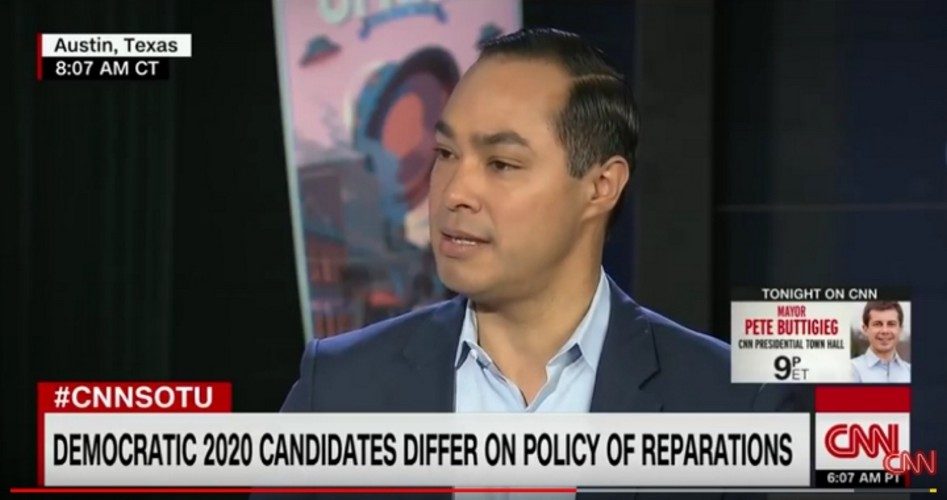
It can be amusing watching the 2020 Democrat presidential contenders fight to get to the left of one another. Abolishing ICE is proposed, followed by a chorus of “That’s a great idea!” Going one better than refusing to build a border wall, Irish Bob (O’Rourke) advocated tearing existing walls down. There also were all the White House hopefuls embracing the Green New Deal like greenbacks from donors.
Then there’s “reparations” for slavery, which also now is becoming “mainstream” (if the new loony-left lib norm can be thus characterized); although the Democrat contenders had limited themselves to proposing tax credits and other subsidies. But enter Julián Castro, the former secretary of Housing and Urban Development under Barack Obama, an obscure presidential hopeful desperate to make some noise.
Castro actually “said on Sunday that he was not ruling out direct payments to African-Americans for the legacy of slavery — in a move that separates him from his fellow Democratic challengers,” reports Fox News.
Speaking on CNN’s State of the Union with show host Jake Tapper, Castro stated that the United States should tackle its “original sin of slavery” and promised if elected president to “appoint a commission or task force to determine the best way to do that.”
Giving the interview “from his home state of Texas — where the former San Antonio mayor is attending the South By Southwest Festival along with a number of other Democratic candidates — Castro questioned why there is opposition to paying African-Americans for the enslavement of their ancestors,” Fox further informed.
“‘If under the Constitution we compensate people because we take their property, why wouldn’t you compensate people who actually were property?’ Castro said” (video below; relevant portion begins at 3:18).
Answer: I suppose we would. The issue?
No such people exist in America.
The slaves are long dead (unless you’re counting citizens who worked for the government for free last year until April 19; they’re called taxpayers).
Castro also hit fellow presidential contender Senator Bernie Sanders (I-Vt.) for opposing direct reparations, in an obvious effort to capture some of the frontrunner’s support. Seizing upon the socialist Sanders’ recent comment that he didn’t think the best remedy was for the United States to “write a check,” Castro made an implicit accusation of hypocrisy. He said that when the issue is tuition-free college or “Medicare for All,” the answer is to “write a check.” So why not with reparations?
Of course, leaving aside these programs’ misguided natures, the answer lies in the words “for All”: These ideas are not race-based. Moreover, technically, they don’t actually involve sending people money that could be used for who knows what.
Yet we do know what the dangled money is being used for here: buying votes. Given that some take the reparations idea seriously, however, we should address it and ask, seriously: Who isn’t owed slavery reparations? As I wrote last year:
Must the Egyptians pay off the Jews? Should descendants of the Spartans compensate those of the Helots? Rome took slaves from all over Europe, including the lands of some of my ancestors. Will I be getting a check?
“But, c’mon,” critics may exclaim, “Rome was ages ago!” Oh? Since antebellum trespasses are fair game, what is the statute of limitations here? An exact number, please.
Some may also point out that “Rome” (Italy) comprises very different people today than two millennia ago, as it had been invaded physically and genetically. Well, the same is true of the United States.
It’s not just that only 25 percent of Southern whites owned slaves. It’s not just that we don’t punish children for their parents’ crimes, as once was done centuries ago. It’s that it’s more than just time (many dead generations) separating victims and victimizers here. Note that many Americans’ ancestors weren’t even in the United States in the antebellum age and were of groups (Germans, Poles, and Russians in my case) never involved in the African slave trade. How are they in any way responsible for 19th-century American slavery?
There’s only one reason an onus is put on them: They have the same skin color as those antebellum American slavers. Racist much?
Note also that hundreds of years ago the aforementioned ethnic groups didn’t consider themselves “one people,” but often fought wars with each other — just as did African tribes. Yet the Left lumps all whites together (just as the white supremacists do, hmm) into one ever-guilty victimizer group.
Of course, making promises generally costs nothing — though in this case implementing the reparations promise (and maybe even making it) could cost the Left. Remember that the United States is now almost 40 percent non-white/Hispanic/Arab. Blacks are only 13 percent of the population, which means that other minorities account for approximately a quarter of it. Moreover, their share of the population is growing; blacks’ isn’t.
Now, question: How do you think these groups will react if their tax money is given to blacks to allegedly right the wrongs of white, 19th-century plantation owners? Remember, there’s no such thing as Hispanic or Asian guilt.
But guilt is unwarranted, period. Note that slavery was once the world’s accepted norm. Yet while the West (“white” civilization) might not have been the first to practice it, it was the first to eliminate it. The West also birthed our modern concept of human rights, which, ironically, is now used to condemn the West.
Moreover, as Professor Walter E. Williams pointed out years ago while guest-hosting the Rush Limbaugh Show, were it not for slavery, America’s blacks (insofar as they’d even exist) would today be in Africa — where grinding poverty is common.
In fact, if black America were a nation, its GDP and GDP per capita would place it well ahead of every single African country. The point is that however any of us got to our shores, we’re blessed to be here and not languishing in the relative poverty that prevails in most of the non-Western world.
The reparation everyone receives is life in America.
Image: screenshot from YouTube video of Julián Castro CNN interview


